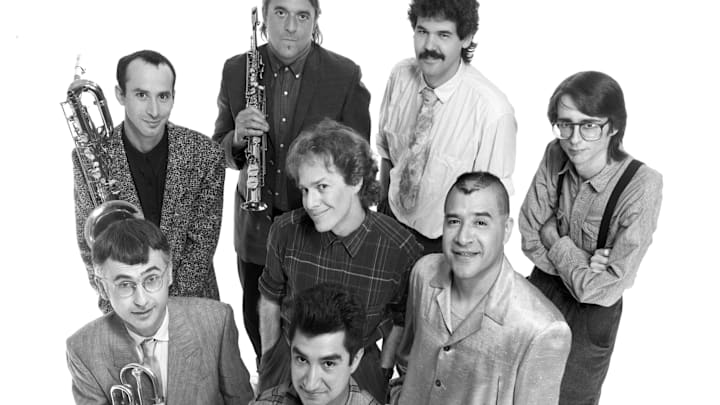Oingo Boingo was an American new wave band known for their eclectic style that blended rock, ska, pop, and funk with elements of avant-garde and world music. The band was active primarily between 1979 and 1995 and developed a cult following, especially in Southern California. As with many iconic rock ensembles, their music was characterized by energetic performances, quirky and theatrical themes, and often satirical or darkly humorous lyrics.
Interestingly, Oingo Boingo started as a performance art group called The Mystic Knights of the Oingo Boingo, founded by Richard Elfman in the early 1970s. Danny Elfman, Richard’s brother, eventually took over the group and transformed it into a new wave band. Also, Danny Elfman found considerable music success despite being rejected from elementary school orchestra "for having no propensity for music." [Bond, Jeff (October 2015). Danse Macabre: 25 years of Danny Elfman and Tim Burton. Warner Bros. pp. 12–259.]
Yes, Danny Elfman, who later became a renowned film composer (notably for his collaborations with Tim Burton), was the band's lead singer and primary songwriter. His distinctive voice and eclectic compositional style defined the band's sound. That being said, the band obviously had other talented musicians, including Dale Turner, Sam "Sluggo" Phipps, John Avila, Steve Bartek, and others.
Some of Oingo Boingo's most popular songs include "Weird Science" – featured in the 1985 movie of the same name. It reached No. 45 on the US Billboard Hot 100, making it their biggest hit. Another respected song by the band is "Dead Man’s Party" – widely recognized and featured in various films and TV shows.
Other Oingo Boingo songs
Check out "Just Another Day." Not to be confused with the Jon Secada song, this one highlighted their unique mix of upbeat music with existential and dark themes. In fact, one might say their music has a touch of "goth" to it (which seems further verified by Elfman's association with Tim Burton).
Then you have "No One Lives Forever," which horror fans might recognize from Tobe Hooper's The Texas Chainsaw Massacre 2 (1986). Syfy notes that the film's first kill scene features iconic villain Leatherface, "strapped to the mummified body of his brother The Hitchhiker (who died in the first film), and the unhinged automotive dance that follows — set to Oingo Boingo's'"No One Lives Forever' — is one of the wildest things you'll find in any slasher movie."
Oingo Boingo's key albums and more musical notes
Their discography includes notable albums such as Only a Lad (1981), Dead Man’s Party (1985), and Boingo (1994). If you listen to the albums in order, it will showcase their evolution from an eccentric ska-influenced band to a more alternative rock sound, as they moved further away from the ska genre, ultimately dropping their horn section (interestingly, Fishbone made a similar move on at least one of their albums, too).
On that note: Oingo Boingo was known for incorporating a wide range of musical instruments, including horns and synthesizers, resulting in a distinctive, layered sound. They were technically ska, but many wouldn't even notice, and one might say that about their pop elements as well. Their lyrics often explored themes of alienation, societal norms, death, and surrealism, which no doubt influenced some listeners (though, in the grander scheme of things, they perhaps never attained the level of influence held by, say, Nirvana's "Smells Like Teen Spirit").
Live performances
The band was famous for their high-energy live shows, particularly their annual Halloween concerts, which became a legendary tradition and drew massive crowds. Feel free to check out the live farewell performance of "No Spill Blood" if you can., for an example of their frenetic energy. Elfman still occasionally plays his earlier Oingo Boingo songs live.
Breakup and legacy
The group disbanded in 1995, performing their final show on Halloween of that year. While Oingo Boingo ceased to exist, Danny Elfman's career as a composer skyrocketed, leaving an enduring legacy with his film scores and the band's influence on new wave and alternative rock. Oingo Boingo's music, with its distinctive sound and darkly comedic undertones, resonated with fans looking for something offbeat yet relatable.
The band’s work has been featured in numerous movies and TV shows, reminding us of its place in pop culture history. Their influence is seen in the way later bands incorporated thematic, theatrical, and multi-instrumental approaches to their music. They are certainly popular enough to be remembered, and their music has the rare feature of definitely sounding 1980s-like, but not feeling quite as attached to nostalgia — likely due to some of their darker, quirkier elements that keep them from being as conventionally pop-oriented as other '80s groups.
